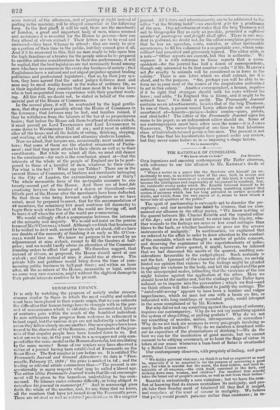NEWSPAPER INFANCY.
IT is only by watching the progress of society under circum- stances similar to those in which the most wealthy and refined must have been placed in their remote origin, that we can estimate the difficulties that human beings have to struggle with in the pur- suit of conveniences which in old states the accumulated labour of centuries puts within the reach of the humblest individual. In new settlements the progress from rudeness to refinement is indeed rapid, but the various steps are not indistinctly marked be- cause they follow closely on one another. Our newspapers have been traced to the diurnalia of the Romans ; and fragments of the jour- nals of that singular people have been handed down to us. But what are we Co say, in the year 1830, to a newspaper not only com- posed after the same model as the Roman diurnalia, but circulating by the same means? Some of our readers may have observed a notice of a journal having been established at Freemantle on the Swan River. The first number is now before us. It is entitled The Reemantle Journal and General Advertiser: its date is "Free- mantle, February 27, 1830 ;" the price is marked is. 6d. ; and the leading or editorial article commences thus—" The present is un- questionably in many respects what 'may be called a liberal age. The editor of the Freenzantle Journal trusts that liberal encourage- ment' will be given to the hazardous undertaking he has com- menced. He labours under extreme difficulty, in being obliged to introduce his journal in manuscript ! " And in manuscript goes forth the whole of the number, and, for any thing that we know, all the numbers that have yet issued from the Freemantle press. There are internal as well as cid:nisi peculisrities in tifs singular journal. Alt letters and advertisements are to be addressed to the editor " at the Stirling hotel"—an excellent gite for a gentleman of the pen. One advertisement states that the brig Thomson will sail to Geographie Bay as early as possible, provided a sufficient number of passengers and freig,ht shall offer. There'is one acci- dent (a godsend, we doubt not, for the editor complains grievously that he has no speeches, routs, suicides, or other fashionable °eminences, to fill his columns) to a respectable ewe, whom some villian* had assaulted and grievously injured. The editor adds, in a note—" Other reports are current, but this is authentic." We suppose it is with reference to these reports that a corre- spondent—for the journal has half a dozen of correspondents, though only advanced to its first number—asks " if Mr. MARTEN'S act for cruelty to animals will be considered as in force in the colony." There is one letter which we shall extract, for it is short, and to the purpose. " Sir, perhaps you will be able to in- form me in your next of the names of the magistrates authorized to act in this colony." Another correspondent, a farmer, inquires if it be right that strangers should milk his cows without his leave ; and adds, "In England this is felony, and it ought to he noticed here." We think it ouOit. The Freenzantle Journal contains seven advertisements, besides that of the brig Thomson. In one of them, a person named Lewis offers for sale an elegant assortment of—hosiery—pickles—ladies' combs—guns, pistols, and shot-belts ! The editor of the Fremantle Journal signs his name to his paper, as an independent editor should do. Some of our contemporaries must have often seen the name—it is JAMES GARDINER. The owner belonged at one time to that laborious class of individuals termed penny-a-line-men. The present is not the first time that his lucubmtions have passed under our review, but they never came before us in so imposing a shape before.
Sic in manuscript°.


























 Previous page
Previous page